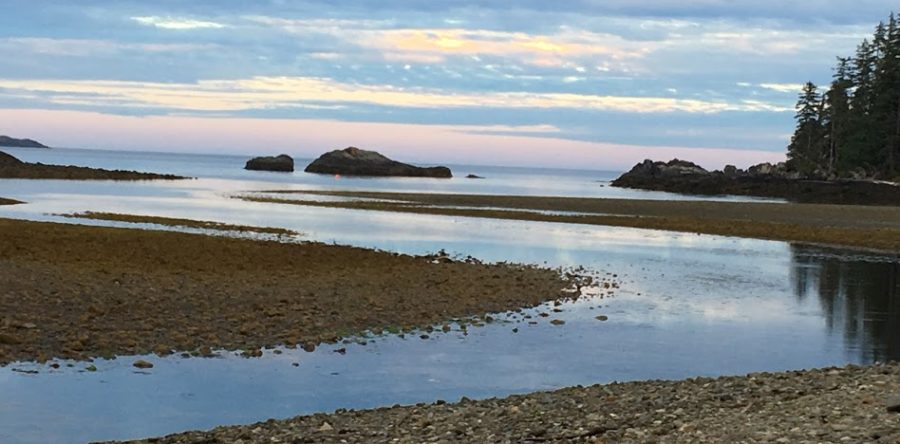COVID-19 and Haida Yah’Guudang: Respecting All Lives
“Like the forests, the roots of our people are intertwined such that the
greatest troubles cannot overcome us.”
– Constitution of the Haida Nation
On Haida Gwaii, the legal tradition of Yah’Guudang goes back as long as the Haida have lived there, from time immemorial. Yah’Guudang means respect for the land and those living upon it, embedded in the Haida worldview that all life is interconnected. Haida Gwaii is a magical archipelago of over 200 islands off the coast of British Columbia, known widely as the “Canadian Galapagos” for its stunning landscape and remarkable biodiversity. The waters teem with dolphins, whales, porpoises, and salmon. Red cedar and Sitka spruce stretch high above the craggy mountains and mossy landscapes, some of the oldest and tallest trees in the world. The Haida have been caretakers of this land and all its inhabitants for thousands of years, protecting the unique ecosystem with a culture based on sustainability and respect for nature and for all living things. The only parallel to the beauty of the landscape is the beauty of the Haida themselves, known for elaborate artistry in wood carvings, weavings, and paintings: art and beauty touch and fill every aspect of their lives. Colonization ravaged these rich cultural traditions and people, now rendered more vulnerable from the spread of COVID-19.
The Haida are no strangers to the threat of virus. The pre-contact population of the Haida is estimated at well over 10,000. Smallpox introduced by European colonizers decimated the Haida’s population by around 90%. Waves of Spanish Flu and Tuberculosis added further devastation. Settlers introduced the scourge of virus while removing the wherewithal to withstand it, suppressing the traditional knowledge supporting their survival. The intricate ceremonies that guided the Haida’s legal foundations and complex social organization – such as the potlatch, dance, sacred healing traditions, and language – were all banned. The biodiversity upon which Haida traditional knowledge and medicine are based were over-exploited. Colonial assaults in the form of residential schools made the community’s health fragile, destroying the fabric of families and leaving deep and lasting life-wounds.
In the face of these tragedies, the Haida have shown tremendous resilience. Yet as with many other Indigenous populations, their community is disproportionately afflicted by respiratory illnesses and diabetes, which, when coupled with the demographic bias of COVID-19 afflicting marginalized communities, makes them susceptible to the virus. Haida Elders – knowledge and language-keepers, and cultural custodians of the Haida’s rich past – have an elevated risk. It is important to consider, argues Prof. Chidi Oguamanam, the “varying degrees of vulnerability of the virus.” Colonial dispossession has left Indigenous nations across Canada without adequate tools to provide critical care. In response to a cry for help during the H1N1 crisis from the Wasagamack First Nation in Manitoba in 2009, Health Canada sent body bags rather than medical supplies. So, while Federal and Provincial authorities dragged their feet to partner with Indigenous communities over COVID-19, many Indigenous nations took action to bring matters into their own hands, implementing self-imposed lockdowns and checkpoints to save lives.
The Haida are among those nations restricting access to their lands. Recently, Haida Nation President, Jason Alsop, stated that the Haida are going to begin easing restrictions, slowly, but ask that visitors stay away. These messages have been respected by some, like BC Provincial Health Minister Dr. Bonnie Henry, but not all. Poet laureate Susan Musgrave, who owns a B&B on the island, has called the Haida Nation’s messaging “too harsh” and unwelcoming. Elsewhere in Canada, others have failed to prioritize the protection of Indigenous lives. One Quebec couple flew to a remote community in the Yukon to escape COVID, potentially endangering them. Worse, one Calgary man threatened to eradicate the Indigenous “species” by bringing COVID onto reserves. Meanwhile, Canadian officials continue to make decisions about Indigenous lives without engaging with Indigenous leadership. In a recent instance in Saskatchewan, the RCMP interrupted a socially-distanced Sundance ceremony, without understanding its role in Indigenous healthcare.
Respect for Indigenous sovereignty is needed: it is time to equip Indigenous communities with the tools and data needed for community-led healthcare and to decolonize medicine by supporting traditional knowledge revitalization. COVID-19’s spotlight on health inequity in Canada must inform future policy: the underfunding of essential services to Indigenous communities is unacceptable, lack of provision of basic needs such as clean water – the first line of defence against the virus for public health – among other critical health gaps need urgent redress.
As the world begins to ease restrictions on lockdowns, it is important to respect the wishes of Indigenous communities to continue to self-isolate and prevent exposure to a second wave of the virus. Reconciliation requires this of us. It requires us to learn from Indigenous legal principles such as Yah’Guudang: respect for all lives. In Indigenous communities, combatting the virus is not a matter of flattening the curve: every life, including the lives of the Elders, is a treasure to be saved. A life is more than a statistic – it is sacred. This is something the rest of Canada needs to learn. The message “you are not welcome” from Indigenous communities is not inhospitable any more than social distancing; instead, it is a call to honour life. Yah’Guudang is Haida ancestral wisdom that we are all #InThisTogether. Respect for life means protecting the vulnerable.






